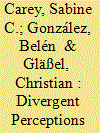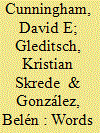| Srl | Item |
| 1 |
ID:
187390


|
|
|
|
|
| Summary/Abstract |
Research on postwar peace focuses primarily on how elites and institutions can prevent relapse into civil war. In line with this special issue’s focus on citizens’ experiences, we take a micro-level approach to explore peace beyond the absence of war. We investigate how members of opposing sides experience peace a decade after a decisive victory of the majority. Using original survey data from a representative sample of 2000 respondents in 2018 Sri Lanka, we find that even one decade after the conflict members of the Sinhalese winning majority are consistently more likely to report improvements in peace than Tamils, who were represented by the defeated minority. But the benefit of a “victor’s peace” does not seem to translate into an optimistic outlook of the victorious group, nor does it increase people’s endorsement for repressive state measures. Despite the drastically improved physical security for the defeated ethnic minority since the war, they experience a deterioration in other dimensions of peace. Our findings have important implications for a deeper understanding of variations in peace and reconciliation processes.
|
|
|
|
|
|
|
|
|
|
|
|
|
|
|
|
| 2 |
ID:
154843


|
|
|
|
|
| Summary/Abstract |
Dissidents can choose among different tactics to redress political grievances, yet violent and nonviolent mobilization tend to be studied in isolation. We examine why some countries see the emergence of organized dissident activity over governmental claims, and why in some cases these organizational claims result in civil wars or nonviolent campaigns, while others see no large-scale collective action. We develop a two-stage theoretical framework examining the organized articulation of political grievance and then large-scale violent and nonviolent collective action. We test implications of this framework using new data on governmental incompatibilities in a random sample of 101 states from 1960 to 2012. We show that factors such as demography, economic development, and civil society have differential effects on these different stages and outcomes of mobilization. We demonstrate that the common finding that anocracies are more prone to civil war primarily stems from such regimes being more prone to see maximalist political demands that could lead to violent mobilization, depending on other factors conducive to creating focused military capacity. We find that non-democracy generally promotes nonviolent campaigns as anocracies and autocracies are both more likely to experience claims and more prone to nonviolent campaigns, conditional on claims.
|
|
|
|
|
|
|
|
|
|
|
|
|
|
|
|